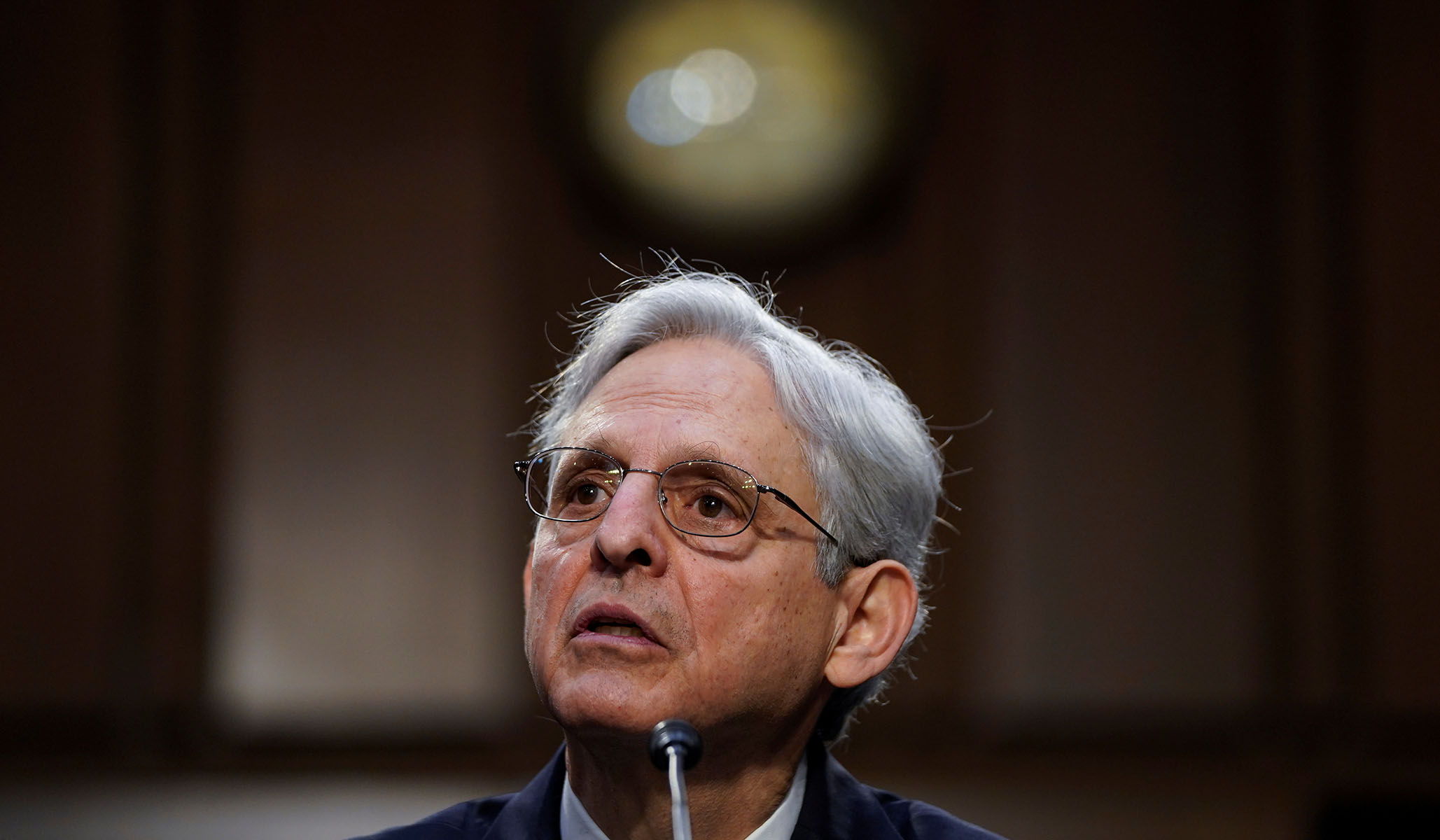by National Review Editors
[A]s Garland is well aware, having been a longtime DOJ official and federal appellate judge, the First Amendment leaves little room for law-enforcement action against speech, particularly action by the federal government.
 |
| Attorney General nominee Merrick Garland testifies during his confirmation hearing before the Senate Judiciary Committee, Washington, D.C., February 22, 2021. (Drew Angerer/Reuters Pool) |
The United States Department of Justice has no business — none — even thinking of involving itself in the give-and-take between parents and school administrators. Questions related to pedagogy and the contents of K–12 curricula are the quintessential domain of state and local governance, and legitimately a matter of robust democratic debate.
A new memorandum issued by Attorney General Merrick Garland to the FBI and federal prosecutors across the country is clearly meant to send a message to one side in that debate, the ones who have been showing up at school-board meetings to protest critical race theory and trans radicalism.
Garland’s memo cynically conflates parents’ dissent against progressive educational indoctrination with “threats of violence against school administrators, board members, teachers, and staff” — the “public servants” who run state school systems. In the blink of an eye, Garland then slides from “threats of violence” into amorphous “threats,” “harassment,” and “intimidation” that he’d also have the FBI probe.
It was interesting to see the Justice Department suddenly bestirred over threats, harassment, and intimidation of public servants on the same day the president opined that such acts were “part of the process” when radical progressives employ them against a Democratic senator seen as blocking the administration’s proposed $3.5 trillion ghastly spendathon. Nevertheless, as Garland is well aware, having been a longtime DOJ official and federal appellate judge, the First Amendment leaves little room for law-enforcement action against speech, particularly action by the federal government. Treating domestic political opposition as a proper subject for FBI investigation has a long and dolorous history, famously including surveillance of Martin Luther King Jr., a figure so dangerous he is now honored with a national holiday.
Under Supreme Court precedents and statutory law, there is no criminal incitement absent unambiguous calls for the use of force, under circumstances not just where the intent of the speaker to provoke violence is clear, but also where the danger of violence is real and imminent. Importantly, even that is not sufficient for federal law enforcement. Under Congress’s incitement statute, there is no crime unless the use of force the speaker urges would be a violation of federal law.
The Justice Department and FBI have no general, national police power. Threats to do harm to others within a state, including threats against state and municipal officials, are reprehensible, and they may well amount to state crimes. Garland’s memorandum nowhere suggests that state law enforcement is inadequate, much less lays out a theory under which the federal government is empowered to act. Indeed, there is no federal crime unless a clear, intentional, real, and imminent threat to use force implicates some cognizable federal interest — e.g., threats to use bombs, the use of the mail or interstate-commerce facilities (such as the Internet) to communicate clear threats of violence, and threats to attack our armed forces, to destroy federal facilities, or to harm federal or foreign government officials.
Thus, the giveaway in Garland’s memo: He proposes that the Justice Department and FBI form a “partnership” with “state, local, tribal, and territorial law enforcement” in order to address threats to school administrators. Why? Because he knows the Justice Department has no legal authority to investigate parents over their dissent against teachers and school boards. The DOJ would need to piggyback on the police power of state and local law enforcement, in blatant violation of constitutional federalism principles that are supposed to keep Washington out of such matters.
Obviously, with the feds unable to validly prosecute even actual threats of violence at the local level, they have no business monitoring what Garland vaguely refers to as “harassment” and “intimidation.” In a free society committed to free expression, we are expected to put up with most forms of harassment and intimidation, even if they are obnoxious and disturbing, as long as they do not pose an immediate threat of forcible harm. And no type of expression gets a wider constitutional berth than public-policy debate.
The Garland memo, then, is a crass intimidation tactic of its own on the part of a politicized Justice Department in an administration that is cowed by and desperate to appease the radical Left. It is an appalling abuse of power that must be resisted, including by Republicans who hope to convince the public to give them control of Congress — and the control of the Justice Department’s enforcement budget that comes with it.
National Review Editors
Source: https://www.nationalreview.com/2021/10/dojs-appalling-crackdown-on-parents/
No comments:
Post a Comment